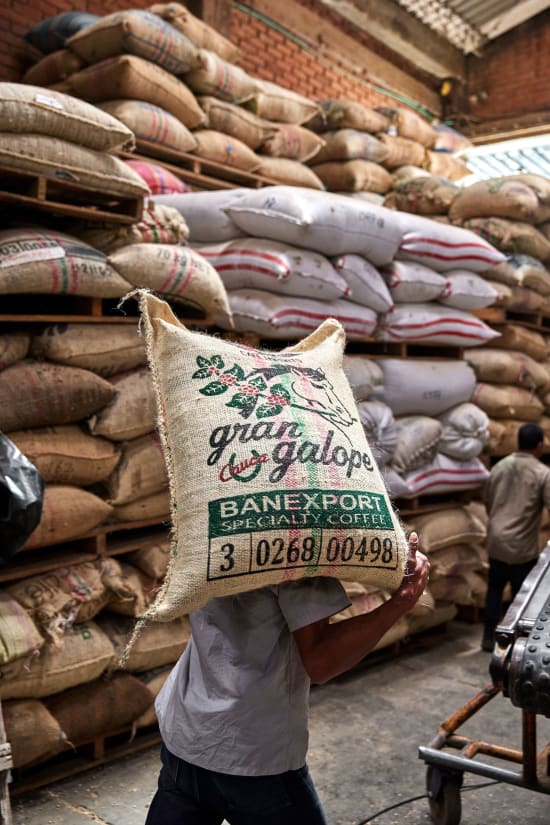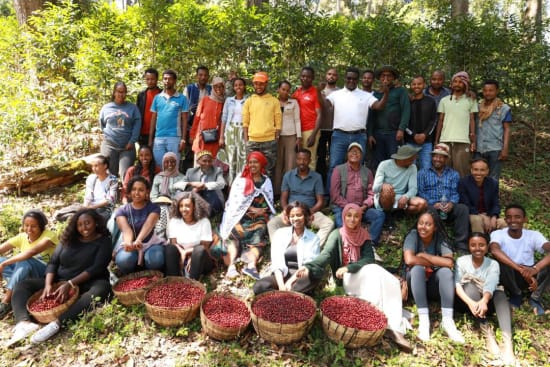What Does Sustainability Mean in Coffee?
What Does Sustainability Mean in Coffee?
Coffee sustainability encompasses a commitment to practices that ensure the longevity of the coffee industry while minimizing negative impacts on the environment, supporting equitable economic structures, and fostering social well-being. This multifaceted approach integrates ecological, economic, and social considerations to create a harmonious and sustainable coffee ecosystem.

What Practices Conserve Nature in Coffee Production?
Sustainability in coffee production embraces practices that conserve nature. Agroforestry stands out as a leading approach, intertwining coffee plants with diverse trees, preserving biodiversity, preventing soil erosion, and fostering a more resilient ecosystem. The synergy between coffee and the natural environment ensures a balance that minimizes the need for chemical interventions, thus preserving the delicate ecological equilibrium.
How Does Sustainability Provide Better Livelihoods for Coffee Growers and Processors?
Sustainability doesn't stop at environmental conservation; it extends to the very livelihoods of coffee growers and processors. Fair trade practices, a cornerstone of sustainability, ensure that these essential contributors receive fair compensation for their efforts. Beyond economic stability, sustainability initiatives often include community development projects, such as education and healthcare, enhancing the overall well-being and empowerment of those involved in the coffee supply chain.
Why is Sustainability Important in the Coffee Industry?
The significance of sustainability in the coffee industry cannot be overstated, considering its pervasive impact on the environment, communities, and the overall quality of the coffee produced.

Photo from Cafe Imports
What Are the Environmental Impacts of Coffee Production?
Coffee production, when not approached sustainably, poses environmental challenges. Unsustainable farming practices contribute to deforestation, habitat destruction, and soil degradation. Moreover, conventional processing methods and excessive water usage can lead to pollution and strain on local water resources.
What Are the Economic and Social Implications for Coffee-Producing Communities?
The economic and social implications of unsustainable coffee production are far-reaching. Unfair compensation, exploitative labor practices, and neglect of social development lead to weakened communities. Sustainable coffee practices, on the other hand, promote fair wages, community empowerment, and improved living conditions, fostering resilience and stability.
What are the Sustainability Concerns in the Coffee Industry?
Sustainability concerns in the coffee industry are critical aspects that demand attention to secure a future for coffee production and the well-being of the communities involved.
What Are the Primary Concerns Related to Deforestation in the Coffee Industry?
Deforestation remains a pressing concern in the coffee industry. Expansion of coffee plantations often involves clearing large areas of forests, leading to habitat loss, diminished biodiversity, and disrupted ecosystems. Sustainable farming practices, including agroforestry and reforestation programs, address this concern by promoting coexistence with existing ecosystems.
How Does Water Usage Impact the Sustainability of Coffee Production?
Water usage poses a significant threat to sustainability in coffee production. Traditional irrigation methods and excessive water consumption in processing contribute to water scarcity and environmental degradation. Sustainable approaches emphasize water-efficient irrigation systems, rainwater harvesting, and the adoption of agroecological practices to ensure responsible water use.
What Threats Does Climate Change Pose to Coffee Species?
Climate change emerges as a formidable threat to coffee species, impacting the suitable growing areas and overall production. Rising temperatures, erratic rainfall patterns, and increased prevalence of pests and diseases jeopardize coffee cultivation. Sustainable initiatives involve research into climate-resilient coffee varieties, adaptive farming practices, and comprehensive strategies to safeguard the diversity and longevity of coffee species.
How do you know if coffee is sustainable?
Determining the sustainability of coffee involves understanding the certifications, practices, and criteria that signify a commitment to ecological, economic, and social well-being.
What Role Do Certification Labels Play in Determining the Sustainability of Coffee?
Certification labels serve as trustworthy indicators of a coffee's sustainability. Recognized labels such as Rainforest Alliance, Fair Trade, and USDA Organic signify adherence to stringent standards. These standards encompass environmentally friendly farming practices, fair labor conditions, and support for community well-being.
What Are the Criteria for Third-Party Certifications in the Coffee Industry?
Third-party certifications in the coffee industry entail rigorous criteria. These criteria often span environmental considerations, fair labor practices, and community engagement. A comprehensive understanding of these criteria empowers consumers to make informed choices aligned with their sustainability values.
How do you make coffee sustainably?
Sustainable coffee production involves a set of practices that prioritize environmental stewardship and ethical considerations throughout the cultivation and processing stages.
What Are the Key Practices for Better Crop Management in Sustainable Coffee Production?
Implementing sustainable practices in coffee cultivation requires a focus on better crop management. Organic farming methods, which eliminate synthetic pesticides and fertilizers, create a healthier ecosystem. Integrated pest management minimizes environmental impact, while precision agriculture optimizes resource use for sustainable cultivation.
How Can Sustainable Coffee Production Reduce Environmental Impact?
Sustainable coffee production actively seeks to reduce its environmental impact. This entails minimizing the use of harmful chemicals, promoting biodiversity through shade-grown practices, and adopting eco-friendly processing methods. Additionally, sustainable initiatives often emphasize regenerative agriculture to restore and enhance the natural ecosystem, further reducing the overall environmental footprint.
Are there specific practices that promote economic sustainability for coffee farmers?
Promoting economic sustainability for coffee farmers involves adopting practices that ensure fair compensation and eliminate exploitation.
How Can Fair Compensation Contribute to Economic Sustainability for Coffee Farmers?
Fair compensation is integral to economic sustainability for coffee farmers. Sustainable initiatives, including fair trade practices, ensure that farmers receive a fair price for their coffee. This fair compensation empowers farmers to invest in their farms, communities, and future endeavors, creating a foundation for long-term economic stability.
What Practices Help in Avoiding Exploitation of Coffee Farmers?
Avoiding the exploitation of coffee farmers necessitates the implementation of ethical practices and transparent supply chains. Sustainable initiatives actively work against exploitative practices by ensuring fair wages, safe working conditions, and transparent trade relationships. By prioritizing ethical treatment, sustainable coffee production fosters a supportive and equitable environment for farmers.
What challenges do coffee farmers face in maintaining social sustainability?
While sustainability initiatives aim to enhance the social aspects of coffee farming, challenges persist that impact the well-being of farmers and their communities.
What Are the Challenges Related to Low Wages Faced by Coffee Farmers?
Low wages remain a significant challenge to social sustainability in coffee farming. Unsustainable practices and unfair compensation structures contribute to economic disparities and social inequalities. Sustainable initiatives, including fair trade practices and advocacy for living wages, seek to address this challenge and uplift the social fabric of coffee-producing communities.
How Does Labor Exploitation Impact the Social Sustainability of Coffee Farming?
Labor exploitation poses a serious threat to the social sustainability of coffee farming. Unethical practices, including child labor, discrimination, and unsafe working conditions, undermine the well-being and dignity of workers. Sustainable coffee production actively opposes labor exploitation, promoting fair and ethical treatment to create socially responsible farming environments.
What Is the Overall Impact on Local Communities?
The overall impact of sustainable coffee production on local communities is profound. Beyond economic contributions, such as fair compensation and community development projects, social sustainability initiatives enhance education, healthcare, and gender equality. This results in empowered and resilient local communities with improved living standards.
What initiatives or programs exist to improve sustainability in coffee-producing regions?
Numerous initiatives and programs are in place to elevate sustainability in coffee-producing regions, addressing environmental conservation, social development, and economic stability.
What Is the Role of Rainforest Alliance Certification in Promoting Sustainability?
Rainforest Alliance Certification plays a crucial role in promoting sustainability by focusing on environmental conservation, social equity, and economic viability. The certification encourages agroforestry, biodiversity conservation, and fair labor practices, making a positive impact on coffee-producing regions.
How Do Shade-Grown Coffee Practices Contribute to Sustainability?
Shade-grown coffee practices contribute significantly to sustainability by promoting biodiversity and environmental conservation. These practices involve cultivating coffee under the canopy of trees, reducing the need for pesticides and creating a symbiotic relationship between coffee plants and the natural ecosystem.
What Does Organic Certification Entail in the Context of Coffee Production?
Organic certification in coffee production ensures that farming practices are free from synthetic pesticides and fertilizers. This commitment to organic methods promotes soil health, biodiversity, and environmental sustainability. Understanding the principles of organic certification provides consumers with confidence in choosing environmentally friendly coffee options.
Is there a connection between fair trade and sustainable coffee?
Fair trade and sustainable coffee share a strong connection, as both movements strive to create a fair and equitable coffee industry that prioritizes the well-being of farmers and the environment.
What Does Fair Trade Certification Signify in the Context of Coffee?
Fair Trade Certification signifies a commitment to ethical and sustainable practices in the coffee industry. It ensures safe working conditions, fair wages, and equitable treatment of workers. By choosing Fair Trade Certified coffee, consumers actively support a supply chain that prioritizes both social and environmental sustainability.
How Does Fair Trade Certification Address Issues Such as Safe Working Conditions and Livable Wages?
Fair Trade Certification goes beyond economic aspects to address critical issues such as safe working conditions and livable wages. The certification enforces standards that prohibit child labor, discrimination, and unsafe practices, fostering an environment where workers are treated with dignity and respect. This emphasis on social responsibility contributes to the overall sustainability of coffee production.
What innovations or technologies are helping improve sustainability in coffee farming?
Innovations and technologies play a crucial role in advancing sustainability in coffee farming, addressing environmental impact, improving efficiency, and ensuring the resilience of coffee production.
How Does the Sustainable Coffee Challenge Contribute to Innovation in Coffee Farming?
The Sustainable Coffee Challenge serves as a catalyst for innovation in coffee farming. It encourages the development and adoption of sustainable practices through collaborative efforts across the industry. The challenge promotes research, technological advancements, and knowledge-sharing to address environmental and social sustainability in coffee production.
What Are Some Technological Advancements in Sustainable Coffee Farming?
Technological advancements play a pivotal role in enhancing sustainability in coffee farming. Precision agriculture technologies enable optimized resource use, reducing environmental impact. Sustainable processing methods, such as water-efficient pulping, contribute to eco-friendly production. Additionally, innovations in crop breeding for climate resilience and disease resistance ensure the long-term sustainability of coffee farming.
Are there drawbacks or challenges associated with transitioning to sustainable coffee practices?
Transitioning to sustainable coffee practices is not without challenges, as farmers and stakeholders encounter initial hurdles that require investment, education, and commitment.
What Are the Initial Challenges and Costs Faced by Farmers When Transitioning to Sustainable Practices?
Transitioning to sustainable coffee practices involves initial challenges and costs for farmers. Investments in organic certification, training programs, and transitioning from conventional to sustainable methods can be financially demanding. However, the long-term benefits, including improved soil health and market access, often outweigh the initial challenges.
How Important Is Education and Awareness in Overcoming Challenges Related to Sustainable Coffee Production?
Education and awareness are critical in overcoming challenges related to sustainable coffee production. Farmers need access to information about sustainable practices, certification requirements, and the potential benefits. Consumer awareness also plays a role in creating demand for sustainable coffee, incentivizing farmers to adopt environmentally friendly and socially responsible practices.
What Efforts Are Being Made to Combat Deforestation in Coffee-Producing Areas?
Deforestation is a significant concern in coffee-producing areas, and concerted efforts are underway to mitigate its impact and promote sustainable land use.
How Do Sustainable Farming Practices Contribute to Combating Deforestation?
Sustainable farming practices actively contribute to combating deforestation by promoting agroforestry. This approach involves integrating trees into coffee plantations, preserving natural habitats, and enhancing biodiversity. By mimicking natural ecosystems, sustainable farming mitigates the negative impact of coffee cultivation on forests.
What Role Do Reforestation Programs Play in Addressing Deforestation in Coffee-Producing Areas?
Reforestation programs play a vital role in addressing deforestation in coffee-producing areas. These programs involve planting native trees, restoring degraded land, and creating buffer zones around coffee plantations. Reforestation contributes to carbon sequestration, protects water sources, and restores ecological balance in coffee regions.
How Are Conservation Initiatives Helping Protect Natural Habitats in Coffee Regions?
Conservation initiatives are instrumental in protecting natural habitats in coffee regions. These efforts focus on preserving biodiversity, supporting wildlife corridors, and creating sustainable landscapes. By partnering with local communities and organizations, conservation initiatives aim to ensure the long-term health of ecosystems affected by coffee production.
What Makes a Coffee Brand Sustainable?
Sustainability in coffee extends beyond farming practices to include the entire supply chain, and a sustainable coffee brand is characterized by commitments, transparency, and ethical practices.
How Does Transparency in Sourcing Contribute to the Sustainability of a Coffee Brand?
Transparency in sourcing is a cornerstone of a sustainable coffee brand. Brands that openly communicate their sourcing practices, including the origin of beans, farming methods, and adherence to certifications, build trust with consumers. Transparent sourcing ensures accountability and allows consumers to make informed choices that align with their sustainability values.
What Commitments and Ethical Practices Define a Sustainable Coffee Brand?
Sustainable coffee brands are defined by their commitments and ethical practices. This includes fair trade certifications, environmentally friendly farming methods, support for social initiatives, and efforts to minimize the overall ecological footprint. These commitments reflect a brand's dedication to holistic sustainability across the entire supply chain.
How Do You Know If Coffee Is Ethical?
Ethical coffee production centers on fair compensation for coffee growers, safe working conditions, and adherence to principles that prioritize the well-being of workers and communities.
What Are the Indicators of Fair Compensation for Coffee Growers in Ethical Coffee Production?
Ethical coffee production places a strong emphasis on fair compensation for coffee growers. Indicators of fair compensation include adherence to fair trade standards, transparent pricing mechanisms, and initiatives that ensure a decent standard of living for farmers. Ethical coffee brands prioritize the well-being of farmers and address economic inequalities in the supply chain.
How Does Transparency in Sourcing Practices Contribute to Ethical Coffee?
Transparency in sourcing practices is a key factor in ethical coffee production. Ethical brands openly share information about the origin of their beans, the conditions of coffee farmers, and the overall supply chain. This transparency allows consumers to verify ethical practices and support brands committed to fair and sustainable sourcing.
Is There a Correlation Between the Price of Coffee and Its Sustainability?
The price of coffee and its sustainability are interconnected, with fair compensation for farmers playing a pivotal role in fostering a sustainable coffee industry.
How Does Balancing Fair Prices for Farmers Contribute to Coffee Sustainability?
Balancing fair prices for farmers is integral to coffee sustainability. Fair compensation ensures that farmers can invest in sustainable farming practices, improve their living standards, and contribute to environmental conservation. A fair pricing model supports the economic viability of coffee farming, fostering long-term sustainability.
What Is the Role of Consumer Awareness and Support in the Sustainability of Coffee Prices?
Consumer awareness and support are essential for the sustainability of coffee prices. Informed consumers who actively seek and support sustainably produced coffee create a demand that encourages fair pricing models. The collective voice of conscious consumers plays a crucial role in shaping the economic sustainability of the coffee industry.
How Do Coffee Companies Ensure Transparency in Their Sourcing and Sustainability Practices?
Coffee companies committed to sustainability actively implement measures to ensure transparency in their sourcing and overall sustainability practices.
How Do Coffee Companies Provide Openness About Farming Location and Practices?
Coffee companies provide openness about farming location and practices through clear communication channels. This includes detailed information on packaging, websites, and marketing materials that highlight the origin of the coffee beans, farming methods employed, and any relevant certifications. Openness fosters trust with consumers and demonstrates a commitment to transparency.
What Measures Ensure Traceability of Beans from Farm to Cup in Coffee Companies?
Traceability of beans from farm to cup is a priority for coffee companies embracing sustainability. These companies implement traceability measures such as batch tracking, certifications, and partnerships with transparent supply chain partners. By tracing the journey of coffee beans, companies can verify sustainable and ethical practices at every stage of production.
What Role Do Consumers Play in Promoting Coffee Sustainability?
Consumers wield significant influence in promoting coffee sustainability through their choices, preferences, and demand for ethical and environmentally friendly practices.
How Does Consumer Choice Impact the Promotion of Sustainability in Coffee?
Consumer choice directly impacts the promotion of sustainability in coffee. By consciously choosing certified sustainable and ethical coffee, consumers signal a demand for responsible practices. This demand, in turn, encourages coffee companies to adopt and adhere to sustainable and ethical standards, creating a positive cycle of consumer-driven sustainability.
What Is the Significance of Consumers Supporting Brands with Ethical Practices in the Coffee Industry?
Consumers supporting brands with ethical practices in the coffee industry contribute to the overall improvement of sustainability standards. Brands that prioritize ethics and sustainability receive validation and support from conscious consumers, driving positive change in the industry. The significance lies in creating a market where ethical practices are rewarded, fostering a more sustainable coffee ecosystem.
What Steps Can Coffee Enthusiasts Take to Support Sustainability in Their Daily Coffee Consumption?
Coffee enthusiasts can actively contribute to sustainability by making informed choices and supporting practices that prioritize environmental and social well-being.
How Can Coffee Enthusiasts Choose Certified Sustainable Coffee in Their Daily Consumption?
Choosing certified sustainable coffee involves selecting beans with recognized certifications such as Rainforest Alliance, Fair Trade, or USDA Organic. These certifications signify adherence to strict sustainability standards and offer consumers confidence in the ethical and environmental credentials of their chosen coffee.
What Role Does Supporting Brands with Transparent and Ethical Practices Play in Promoting Sustainability?
Supporting brands with transparent and ethical practices is a powerful way for coffee enthusiasts to promote sustainability. By favoring brands that openly communicate their sourcing, sustainability initiatives, and ethical commitments, consumers create a demand for transparency and ethical conduct in the coffee industry.
Which Type of Coffee Is the Most Sustainable?
Different types of coffee align with varying degrees of sustainability, with certain characteristics and certifications indicating a commitment to environmentally friendly and socially responsible practices.
How Does Shade-Grown Coffee Contribute to Sustainability?
Shade-grown coffee contributes significantly to sustainability by preserving biodiversity and minimizing the environmental impact of coffee cultivation. This method involves growing coffee under the canopy of diverse trees, creating a natural habitat that supports wildlife and reduces the need for synthetic inputs.
What Criteria Make Rainforest Alliance Certified Coffee a Sustainable Choice?
Rainforest Alliance Certified coffee is a sustainable choice due to its adherence to rigorous environmental, social, and economic standards. The certification ensures responsible land use, conservation of biodiversity, fair treatment of workers, and support for community development initiatives.
How Does Organic Coffee Align with Sustainability Principles?
Organic coffee aligns with sustainability principles by eschewing synthetic pesticides and fertilizers. Organic farming methods prioritize soil health, biodiversity, and environmental conservation, making organic coffee a sustainable choice for environmentally conscious consumers.
What Are the Environmental Impacts of Coffee Production?
Coffee production, when not approached sustainably, can have significant environmental impacts that affect ecosystems, water resources, and contribute to climate change.
How Does Water Usage Contribute to the Environmental Impact of Coffee Production?
Water usage is a critical factor contributing to the environmental impact of coffee production. Conventional irrigation methods and water-intensive processing practices can lead to depletion of local water resources and pollution. Sustainable coffee production focuses on efficient irrigation, rainwater harvesting, and water-conscious processing to mitigate these environmental impacts.
What Role Does Deforestation Play in the Carbon Footprint of Coffee Production?
Deforestation significantly contributes to the carbon footprint of coffee production. Clearing land for expanding coffee plantations releases stored carbon, disrupts ecosystems, and exacerbates climate change. Sustainable farming practices, including agroforestry and reforestation, actively address this concern by integrating trees into coffee plantations and preserving natural habitats.
How Does Climate Change Affect Coffee Sustainability?
Climate change poses a multifaceted challenge to coffee sustainability, impacting growing conditions, yields, and overall production.
How Does Climate Change Impact the Suitable Growing Areas for Coffee?
Climate change alters the suitable growing areas for coffee, pushing coffee cultivation to higher altitudes and latitudes. Rising temperatures and unpredictable weather patterns affect the quality and flavor profile of coffee. Sustainable initiatives involve research into climate-resilient varieties and adaptive farming practices to ensure the continued viability of coffee cultivation.
What Effects Does Climate Change Have on Coffee Production?
Climate change has diverse effects on coffee production, including altered rainfall patterns, increased incidence of pests and diseases, and extreme weather events. These challenges threaten the stability and yields of coffee crops. Sustainable approaches actively address climate change impacts by fostering resilient varieties, implementing adaptive farming practices, and advocating for policies that mitigate climate-related risks.
In conclusion, sustainability in coffee encompasses a holistic approach that considers environmental, economic, and social factors. From agroforestry and fair trade practices to technological innovations and consumer choices, each aspect plays a crucial role in shaping a sustainable coffee industry. By understanding the multifaceted nature of coffee sustainability and actively supporting ethical and environmentally friendly practices, stakeholders can contribute to a resilient and thriving future for the global coffee community.












